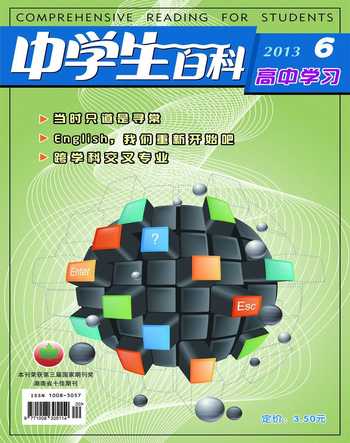My Embeace of Liberal Arts Education
钟凯纹
When I began my study in Cornell University one year ago,I was asked by many — relatives,friends,classmates,professors,and even strangers:“What is your major?”I would say:“Undecided.”Some of them would nod and comment:“Nice!”and then add“then you are in arts?”
Here,their so?鄄called“arts”means“liberal arts”education in the arts and sciences education,rather than those subjects as drawing,painting,and sculpturing which are more often regarded as“fine arts.”Of course,liberal arts education can include fine arts cultivation,but it also covers areas like biological and social sciences,and the humanities. According to Wikipedia①, an encyclopedia website,liberal arts education generally refers to“matters not relating to the professional,vocational,or technical curricula②.”
Back to the question,my answer is—well,yes. Except I was not so sure about attaining a liberal arts education at the beginning of my freshman year. I sometimes feel I am compelled to be a liberal arts student only for the reason that I have no idea about what my interests lie in and what my strengths are. Being“undecided”in the college of arts and sciences bothers me at times—it is just an euphemism③ of me“being lost”and having no idea what I am doing in Cornell University. On top of that, liberal arts education is sometimes viewed as too broad, especially comparing to professional and vocational education such as pre?鄄med④,engineering,and so on.
The requirements for College of Arts and Sciences in Cornell University are also significantly different from those of other colleges,say,Hotel Administration,or Engineering. In Arts and Sciences,you have a long list of what you have to do in order to graduate:learn one foreign language, meet breadths requirements and distribution requirements,and so on. For example,if I major in Government,in addition to my core major courses,I have to learn a different language,some knowledge about both ancient and modern things,about both similar cultures(from the US,Europe,and Canada)and different cultures(from Asia,Africa,Oceania and so forth),and I also have to take math and science classes. Whereas for students in other more vocational colleges in Cornell,even though most of them have to take some courses outside of their major,they do not have so many“unrelated” requirements.
Because I am unsure about my future academic directions and also I have to get those requirements done,I started exploring and taking courses from different majors,areas, and even colleges. I took both classes in humanities and natural sciences in my first semester. During my second semester of freshman,I even attempted taking many classes in Engineering college in order to find out if I was meant to be an engineer. It did not all work out so well. My grades were not as good despite my hard work.
However,I do pride myself for the past semester and being a bit all over the place with my study. The subject matters I learned in the engineering courses intrigued⑤ me especially when they were taught by humorous and intelligent professors. The vigor⑥ and passion in the courses refreshed me. I made so many engineering friends and their quick and agile⑦ thinking inspired me.
More important of all,the“unrelated courses”gave me brand new knowledge and perspectives⑧. The Computer Science Matlab courses gave me basic understanding of programming,which I knew would become increasingly important in the coming years. I learned programming language of Matlab,very similar to other programming languages such as Java and Pyphon,and I am no longer foreigner of computer science languages. By writing programs for some simple games and searching tools,I had to approach a problem in a more careful and logical way(I even made an English word learning tool with the directions of a professor). In my Operations Research class,I was surprised to learn that one can actually use algorithms⑨ and math to solve real?鄄world problems. These courses gave me new perspectives and reminded me to be clear,logical,as well as passionate.
I do not consider taking those classes a waste of time,though. For instance,I have learned engineering is not my thing. I had broad interests and I did not have a particular direction that I wanted to pursue because I knew too little about those choices in front of me. But now I am not worried. I am distinguishing⑩ between those that I want to do and those I do not. I am narrowing my options down while gaining considerable and well?鄄rounded knowledge in the process, thanks to the long list of liberal arts requirements.
Thanks to the fact that I was open to liberal arts education at first.
(By Kaiwen Zhong on Aug.25,2012 in Ithaca, NY)
① Wikipedia n. 维基百科。
② http: // en.wikipedia.org / wiki / Liberal_arts
③ euphemism n. 委婉语;委婉说法
④ pre?鄄med n. 医学院预科
⑤ intrigue vt. 激起……的好奇心
⑥ vigor n. 精力,活力
⑦ agile adj.灵巧的
⑧ perspective n. 观点, 想法;角度,远景, 景
⑨ algorithm n. 运算法则
⑩ distinguish vt. & vi. 辨别, 区别
Well?鄄rounede adj. 全面的,多姿多彩的
编辑/梁宇清

